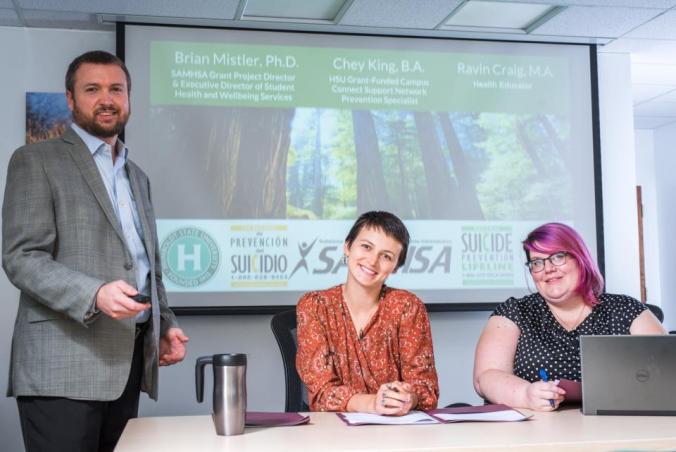Federal SAMHSA Campus Connect Grant
Table Contents:
Humboldt Summary - SAMHSA Grant Award - Garrett Lee Smith - Research Team - Resources

Cal Poly Humboldt
Cal Poly Humboldt (Humboldt) is a public university and the northernmost campus of the 23-school California State University (CSU) system. Humboldt is located in beautiful Arcata, California, where the giant redwoods meet the ocean. With approximately 8,000 students on campus, Humboldt serves a diverse range of students. You can click here for more population data and visit wellbeing.humboldt.edu/data for our campus statistics specific to student medical services, health education, and counseling and psychological services (CAPS). Nationally the need for mental health services continues to increase, as confirmed by reports of the Association for University and College Counseling Center Directors (AUCCCD) Annual Director's Survey Report and data shared by the Center for Collegiate Mental Health (CCMH). Humboldt continues to outpace national norms in the rate of student health concerns and demand for related services.
SAMHSA Grant Recipient
As one piece of the plan to address campus-wide mental health challenges, the grant from Substance Abuse and Mental Health Services Association (SAMHSA) and Department of Health and Human Services (DHHS) provides resources to develop the capacity for campus-wide education efforts and response planning. SAMHSA has awarded Humboldt with just over $300,000 as part of the Garrett Lee Smith (GLS) Memorial Act to implement a suicide prevention program, following a successful application by the grant's author and Principle Investigator, Brian Mistler Ph.D., who serves as Executive Director of Student Health and Wellbeing Services. The grant team who will implement this program consists of Dr. Brian Mistler (Project Director), Ravin Craig (Health Educator), along with Dr. Jen Sanford, Director of Counseling and Psychological Services (CAPS) and Associate Director of Student Health and Wellbeing Services, as well as the team of therapists and peer-health educators who provide training across campus. They aim to: 1) reduce rates of suicide attempts in overall student body which currently exceed national norms by 300-400%, 2) especially target interventions to these key groups identified by The National Action Alliance for Suicide Prevention as high-risk populations: Latina youth, American Indian and Alaska Native (AI/AN), youth who identify as lesbian, gay, bisexual, or transgender (LGBT), and military service members and veterans, 3) educate faculty, staff, and student leaders in key models for recognizing the signs of risk factors for suicide, through programs like our Faculty/Staff Wellbeing Ambassador program, 4) and increase awareness of resources including the 1-800-273-TALK (8255), The National Suicide Prevention Lifeline.
"Even with the best efforts, we know statistically in a community our size some individuals may still heartbreakingly choose to end their own life; of course, it's helpful to prepare emotionally and logistically for such catastrophes, to the degree it's really possible for anyone. We must also act urgently and tirelessly, as Humboldt is with this effort and a dozen other new initiatives, to implement everything possible as an institution to improve our campus-wide safety net and empower all of us with the tools to identify and help students in need, systematically increase key protective factors like students' sense of connectedness and hope, and -- doubly critical in our under-served community -- improve access to sustainably-resourced and properly-trained on-campus health and counseling staff, all the while watchful of ways to reduce access to lethal means, " explains the grant's author Dr. Brian Mistler.
In order to maintain optimal functioning and help develop the skills to support holistic, lifelong health and wellbeing for Humboldt students, the grant team will be promoting healthy behaviors, training campus groups, disseminating materials, and tracking the efficacy of interventions. This will begin by creating a “campus safety net” through the Humboldt Campus Connect Support Network (CCSN) and the Jed Campus Team to collectively work to improve detection, support, and appropriate referral of those at risk for substance abuse, suicide attempts, and death by suicide and to improve response protocols for student death and suicide postvention following national recomendations such as those outlined in Postvention: A Guide for Response to Suicide on College Campuses, created by the Higher Education Mental Health Alliance (HEMHA) and partnering with The JED foundation to further support adherence to best practices. Through these efforts, Dr. Mistler, Ravin Craig, Chey King, Jen Sanford, and the rest of the team hope to build essential capacity and infrastructure to support expanded efforts to promote wellness and help-seeking of all students, and educate campus about referral techniques to link Humboldt with individualied on-campus options for support, including the new Interactive Wellbeing Map which is available to all students (see the recent Lumberjack article for more details) and to faculty to add directly to their canvas courses, and track the success in raising awareness of national and local resources to assist students’ development for current and lifelong health and safety even after the end of the grant.
About Garrett Lee Smith
Garrett Lee Smith, son of Senator Gordon Smith of Oregon, "loved the outdoors and spending time with family and friends." After his son's death by suicide in 2004 the day before his 22nd birthday, Senator Smith proposed the Garrett Lee Smith (GLS) Memorial Act, which recognized suicide as the third leading cause of death among youth ages 10 to 24. Eventually, the Act would allow campuses, tribes, and states to apply for and receive grants to help them prevent stories like Garrett's from devastating other families. Humboldt is one of these GLS recipients through SAMHSA and, following the aims of the GLS Memorial Act, joins the national work to prevent campus deaths by suicide.
Resources
Three Step Theory of Suicide for Campuses
Postvention and Contagion Reduction for Suicide Gatekeeper Training
Meet the Research Team:
 Brian Mistler (Project Director)
Brian Mistler (Project Director)
A Psychologist by training and national university mental health expert, Brian J. Mistler (Ph.D.) has over a decade of experience in higher education administration overseeing a range of services including medical, counseling, recreation, alcohol and other drugs, health education, and wellness promotion at both public and private institutions, and currently serves as Executive Director of Student Health and Wellbeing Services at Humboldt. In each role, Mistler has partnered with campus stakeholders, local community members, and state experts to strategically build a safe, innovative, and holistically-healing environment for students in a way that addresses mental health, suicide prevention, and substance abuse, conscious especially of the needs of first-generation, socio-economically diverse populations. Mistler has taught at universities and hospitals throughout his career, and published widely on mental health and emerging social justice issues. He has served on the boards of The Center for Collegiate Mental Health, The Journal of Student Affairs Research and Practice, and The Journal of College and University Student Housing, and on the the Association of University and College Counseling Center National research team. Mistler was an advisor to The Higher Education Mental Health Alliance and The Jed Foundation in outlining the national Response to Suicide on College Campuses guidelines, is a national trainer for campus police, BiT teams, senior officers, and Community Emergency Response Teams (CERT) on organizational change management, regulatory compliance, and campus emergency preparedness, and serves regularly on the faculty of the NASPA Higher Ed. Law Certificate Program.
 Ravin Craig (Health Educator)
Ravin Craig (Health Educator)
Ravin Craig is the Health Educator for Cal Poly Humboldt (Humboldt). Humboldt is located in northern California and is a part of the California State University System. Ravin has a Bachelor's in Political Science and Multicultural Queer Studies, she also has a Master's Degree in Interdisciplinary Social Sciences with a focus on college community health communication. Ravin runs Humboldt's on-campus food pantry Oh SNAP Student Food Programs and the Humboldt Peer Health Education Program. She has a passion for food sovereignty, mental health advocacy, sex positivity, and justice-minded health education.